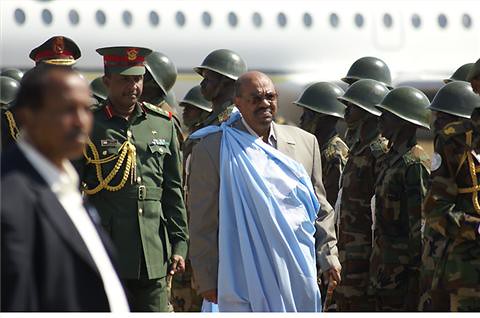
Sudan President Omar Hassan al-Bashir visited the south of Sudan in a last minute plea for national unity ahead of the referendum on January 9, 2011 on the future of the region. Bashir says he will respect the outcome of the vote., a photo by Pan-African News Wire File Photos on Flickr.
North, south Sudan clash before split - south army
By Alex Dziadosz and Jeremy Clarke
KHARTOUM/JUBA (Reuters) - South Sudan's army said it clashed with northern troops in the disputed Abyei border region on Wednesday, in the latest sign of deteriorating relations in the build-up to the secession of the south in July.
Long-standing tensions between northern and southern-aligned groups along the shared border have come to a head less than a month before the independence of the oil-producing south.
Southerners overwhelmingly voted to declare independence from the north in a January referendum promised in a 2005 peace deal that ended decades of civil war with the north, fought over religion, ethnicity, oil and ideology.
A return to full north-south conflict could have a devastating impact on the region by sending refugees back across borders and creating a failed state in the south at birth.
The south's army said its troops clashed with northern soldiers in Abyei on Wednesday more than three weeks after the northern military seized the fertile, oil-producing area.
A spokesman for the northern army said he had no information about any clashes on Wednesday.
The northern army has also been fighting southern-aligned armed groups in Southern Kordofan -- a northern, oil-producing state that surrounds Abyei on the ill-defined north-south border -- since June 5.
OBAMA CALL
U.S. President Barack Obama urged Sudan's government to halt military operations in Southern Kordofan and called for a cease-fire.
"There is no military solution," Obama said, appealing directly to leaders on both sides in an audio message issued through the U.S. government-funded Voice of America network.
Analysts have said the north may be trying to assert its authority along the north-south border to stamp out any remnants of southern support ahead of the split.
The division of Africa's largest country is a highly sensitive subject for the Khartoum government of President Omar Hassan al-Bashir which stands to lose around a third of its territory and up to three quarters of its oil reserves when the south leaves.
The United Nations on Wednesday said air strikes on Southern Kordofan may have killed as many as 64 people and caused tens of thousands to flee.
"There is a growing sense of panic among some of the displaced populations who find themselves trapped by the ongoing violence and the ethnic fault lines," the U.N. Office for the Coordination of Humanitarian Affairs (OCHA) said in a report.
In Geneva, a spokeswoman for the U.N. refugee agency (UNHCR) said the situation in Southern Kordofan was deteriorating and that a "humanitarian corridor" should be created for aid deliveries.
"The problem is that the fighting is spreading by the day," said Fatoumata Lejeune-Kaba.
"POLITICAL RUMOURS"
Some civilians were being targeted at checkpoints, she said.
"We even have unconfirmed reports -- people are telling us about torture, harassment, sometimes summary executions at checkpoints ... It is difficult for us to confirm that, but that is what displaced are telling us," she added.
Northern official Rabie Abdelati on Tuesday dismissed allegations of arbitrary torture, arrest and killing in Southern Kordofan as "political rumours."
Both north and south still have to resolve a list of issues ahead of the split, including how they are doing to share the country's oil wealth, the position of their border and the status of Abyei.
Abyei was a key battleground in the civil war and a symbol for both the mostly Muslim north and the south, where most follow Christian and traditional beliefs.
"SPLA and SAF clashed in Abyei in the area of the Kiir bridge (on Wednesday)," southern army spokesman Philip Aguer said, referring to the north's Sudanese Armed Forces (SAF) and the south's Sudan People's Liberation Army (SPLA).
The river, known as Kiir in the south and Bahr al-Arab in the north has become a frontline between northern and southern troops since Khartoum occupied the region.
Aguer said there had been casualties, but did not release any numbers.
The north says it moved into Abyei after southern soldiers attacked its troops in the area. The north has also accused southern-backed groups of trying to start a revolution in Southern Kordofan, the north's main oil state and home to some groups that sided with the south during the civil war.
After talks in neighbouring Ethiopia over the weekend, both sides announced on Monday they had agreed "in principle" to pull their troops out of Abyei and deploy Ethiopian peacekeepers.
Southern minister Deng Alor told reporters in Addis Ababa the north was now holding up discussions over the withdrawal of northern troops with last minute conditions.
"Bashir has agreed to withdraw, but the problems are over his request to administer Abyei and over the status of the Ethiopian troops," Deng Alor, south Sudan's minister for regional cooperation, told reporters in Addis Ababa.
(Additional reporting by Fredrik Dahl in Geneva and Aaron Maasho in Addis Ababa; Writing by Andrew Heavens)
First Published: 2011-06-15 13:07:32
Updated 2011-06-15 22:01:20
No comments:
Post a Comment